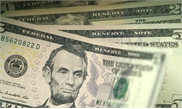
People walk across a street near the Treasury Department in Washington D.C., the United States, May 7, 2020. U.S. (Xinhua/Liu Jie)
The top three foreign holders of US treasury securities, Japan, China and the UK, all reduced their holdings in April against the backdrop of restricted US dollar liquidity and loose monetary policy in the pandemic-fueled turmoil.
Japan, which has the highest exposure to US treasury securities, trimmed its holdings to $1.266 trillion in April, compared to $1.271 trillion last month, according to the US Department of the Treasury on Monday.
China reduced its holdings to $1.0728 trillion from $1.0816 trillion and the UK's holdings were also down to $368.5 billion from $403.2 billion last month.
The offloading comes amid a global surge in demand for US dollars as the coronavirus crisis has stifled liquidity, Liu Xuezhi, a macroeconomics expert at the Bank of Communications told the Global Times on Tuesday.
"As the coronavirus pandemic continues to fuel turmoil in the financial markets, the pessimistic economic outlook has dragged down the yields from US treasury bonds, and countries are selling off in exchange for more US dollar liquidity," Liu said.
The yields from US treasury securities have been falling following loose monetary policies during the coronavirus, making them a less attractive investment option for central banks. In March, the 10-year treasury yield fell below 0.8 percent after the Federal Reserve cut the interest rate to zero in an emergency move. The 10-year treasury yield was at 0.708 percent on Monday.
According to Liu, in the next few months countries may turn to other assets, including gold, if the yield from US treasury bonds continues to drop.
According to the World Gold Council, central banks around the world bought a total of 31.6 tons of gold in April, and there is increasing interest in gold's performance in times of crisis among the world's central banks, according to a report by the council.



